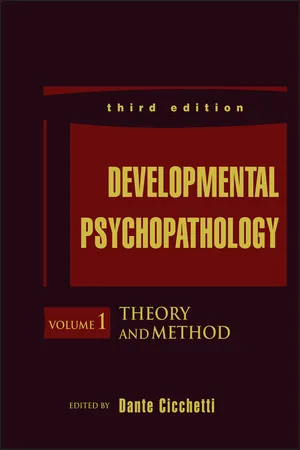
- English
- ePUB (mobile friendly)
- Available on iOS & Android
Developmental Psychopathology, Theory and Method
About this book
The seminal reference for the latest research in developmental psychopathology
Developmental Psychopathology is a four-volume compendium of the most complete and current research on every aspect of the field. Volume One: Theory and Method focuses on the theoretical and empirical work that has contributed to dramatic advancements in understanding of child and adult development, including findings in the areas of genetics and neurobiology, as well as social and contextual factors. Now in its third edition, this comprehensive reference has been fully updated to reflect the current state of the field and its increasingly multilevel and interdisciplinary nature and the increasing importance of translational research. Contributions from expert researchers and clinicians provide insight into how multiple levels of analysis may influence individual differences, the continuity or discontinuity of patterns, and the pathways by which the same developmental outcomes may be achieved.
Advances in developmental psychopathology have burgeoned since the 2006 publication of the second edition ten years ago, and keeping up on the latest findings in multiple avenues of investigation can be burdensome to the busy professional and researcher from psychology and related fields. This reference solves the problem by collecting the best of the best, as edited by Dante Cicchetti, a recognized leader in the field, into one place, with a logical organization designed for easy reference.
- Get up to date on the latest research from the field
- Explore new models, emerging theory, and innovative approaches
- Learn new technical analysis and research design methods
- Understand the impact of life stage on mental health
The complexity of a field as diverse as developmental psychopathology deepens with each emerging theory and new area of study, as made obvious by the exciting findings coming out of institutions and clinics around the world. Developmental Psychopathology Volume One: Theory and Method brings these findings together into a cohesive, broad-reaching reference.
Tools to learn more effectively

Saving Books

Keyword Search

Annotating Text

Listen to it instead
Information
Chapter 1
Assessment of Psychopathology in Young Children
- INTRODUCTION
- EARLY PROBLEMS MATTER
- Progress in Psychiatric Diagnosis in Young Children
- IMPORTANT CONSIDERATIONS IN YOUNG CHILD ASSESSMENT
- Reliance on Caregivers for Information
- Sensitivity to Contextual Influences, Including Caregiving Contexts
- DOMAINS OF DEVELOPMENT
- SELECTING AN ASSESSMENT APPROACH AND TOOL
- Types of Tools
- Understanding Psychometric Properties
- Reliability
- Validity
- Validity of Classification
- Normatization
- Cultural Validity and Cultural Norms
- Knowing What Problems Are Really Being Assessed
- Response Formats
- Summary
- ASSESSMENT TOOLS
- Screening Methods
- Screening Methods Characteristics of Screening Tools
- Selected Screening Tools
- Comprehensive Dimensional Tools for Assessing Social-Emotional/Behavioral Problems
- Selected Dimensional Checklists
- Variation in Emphasis of the Domains That Are Assessed
- Diagnostic Approaches
- Selected Diagnostic Interviews
- Psychometric Properties of Diagnostic Interviews
- Observational Assessment
- Assessing Impairment
- CONCLUSIONS AND DIRECTIONS FOR FUTURE RESEARCH
- REFERENCES
Introduction
Early Problems Matter
Table of contents
- Cover
- Title Page
- Copyright
- Table of Contents
- Dedication
- Preface to Developmental Psychopathology, Third Edition
- Contributors
- Chapter 1: Assessment of Psychopathology in Young Children
- Chapter 2: Developmental Issues in Assessment, Taxonomy, and Diagnosis of Psychopathology: Life Span and Multicultural Perspectives
- Chapter 3: Developmental Epidemiology
- Chapter 4: Using Natural Experiments to Test Environmental Mediation Hypotheses
- Chapter 5: Developmental Models and Mechanisms for Understanding the Effects of Early Experiences on Psychological Development
- Chapter 6: Emotional Security Theory and Developmental Psychopathology
- Chapter 7: Emotion and the Development of Psychopathology
- Chapter 8: Attachment and Developmental Psychopathology
- Chapter 9: Autonomy and Autonomy Disturbances in Self-Development and Psychopathology: Research on Motivation, Attachment, and Clinical Process
- Chapter 10: Roots of Typical Consciousness: Implications for Developmental Psychopathology
- Chapter 11: I-Self and Me-Self Processes Affecting Developmental Psychopathology and Mental Health
- Chapter 12: Peer Relations and Developmental Psychopathology
- Chapter 13: Family Systems from a Developmental Psychopathology Perspective
- Chapter 14: Adolescent/Young Adult Romantic Relationships and Psychopathology
- Chapter 15: What Can Dynamic Systems Models of Development Offer to the Study of Developmental Psychopathology?
- Chapter 16: A Survey of Dynamic Systems Methods for Developmental Psychopathology
- Chapter 17: Missing Data
- Chapter 18: Person-Oriented Approaches
- Chapter 19: Person-Specific Approaches to the Modeling of Intraindividual Variation in Developmental Psychopathology
- Chapter 20: Configural Frequency Analysis for Research on Developmental Processes
- Chapter 21: Moderation and Mediation in Interindividual Longitudinal Analysis
- Chapter 22: Latent Growth Modeling and Developmental Psychopathology
- Chapter 23: Integrative Data Analysis for Research in Developmental Psychopathology
- Author Index
- Subject Index
- End User License Agreement
Frequently asked questions
- Essential is ideal for learners and professionals who enjoy exploring a wide range of subjects. Access the Essential Library with 800,000+ trusted titles and best-sellers across business, personal growth, and the humanities. Includes unlimited reading time and Standard Read Aloud voice.
- Complete: Perfect for advanced learners and researchers needing full, unrestricted access. Unlock 1.4M+ books across hundreds of subjects, including academic and specialized titles. The Complete Plan also includes advanced features like Premium Read Aloud and Research Assistant.
Please note we cannot support devices running on iOS 13 and Android 7 or earlier. Learn more about using the app